
The Enlightenment produced theories of great ambition that aimed to break from dogma, to put reason in the hands of humanity and to imagine possible futures and then pursue them. The Enlightenment also brought devastation to humanity in connection with research practices that grew both abstract and narrow. Communication and media studies developed largely outside theoretical debates surrounding restricted ambitions for the scale of conceptual work, settling research into enclaved practices. This article argues for a critical return to Enlightenment criticality where an evolutionary perspective meets other ambitious attempts to reach the scale of a philosophical anthropology in which “theory” aims beyond the particular and the present. Three exemplars that lead to a convergence of that aim are discussed, by characterising the work of Jürgen Habermas, Harold Adams Innis and Thomas Piketty.
Available at: http://works.bepress.com/ed_mcluskie/22/
